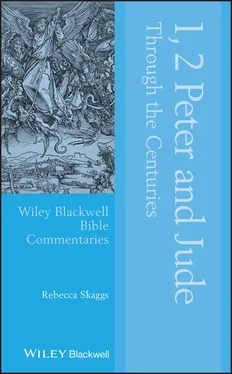Hilary of Arles (c. 403–448) emphasizes that God’s actions to redeem us require no help from us ( Intro. Comm. on 1 Peter , PLSupp 3: 101: ACC); see also Andreas ( Catena , CEC: 42) and Bede ( Comm ., 1985: 71).
Throughout the epistle, hope continues to be a central idea. “Living hope” follows from being reborn and chosen; they are not only living an existence that is dynamic and authentic, they also are looking forward in anticipation to an inheritance (v.4) and salvation (v.5). The LXX uses the term “inheritance” over two hundred times, often in reference to the land of Canaan. Here, our author reflects the New Testament usage, referring to a spiritual, eternal, kingdom (e.g., Matt. 25:34; Mark 10:17; Luke 25). An early issue here is whether the inheritance is earthly and physical or eschatological and spiritual. Many early church leaders understood it in the eschatological sense. Oecumenius explains God’s blessings:
This hope is not the kind of hope which God gave to Moses, that the people would inherit a promised land in Canaan, for that hope was temporal and corruptible … Rather, God gives us a living hope, which has come from the resurrection of Christ. ( Comm. on 1 Peter , PG 119: 516: my tr.)
Clement of Alexandria is more interested in the nature of the incorruptible body as a part of the inheritance and the soul’s relation to the corruptible body:
The soul never returns a second time to the body in this life … in the resurrection the soul returns to the body, and both are joined to one another according to their peculiar nature. ( Adumbrations : FC: ccel.org)
In v.4, Peter describes the inheritance in terms of three negatives, it “can never perish, spoil or fade”; several early writers address this, further supporting the understanding that it is spiritual rather than physical. Didymus the Blind (313–398) is one of the earliest to comment:
Peter calls it incorruptible and unfading, demonstrating by this that it is a pure and divine inheritance which will remain uncontaminated. ( Comm. on 1 Peter , PG 1756: my tr.; Hilary of Arles agrees, Intro. Comm. on 1 Peter )
In contrast, Bede reads “hope” in relation to our anticipation of the resurrection in the time to come, rather than as an earthly physical inheritance ( Comm ., 1985: 71–72). He adds a practical application to the description:
[Our inheritance is] imperishable because the heavenly life is untouched by age or disease or any sorrow … unfading, because the heavenly way of life cannot at last become worthless. ( Comm ., 1985: 72)
Andreas also emphasizes that the inheritance is heavenly, not earthly ( Catena ). Clearly, for these early writers, inheritance involves a future state of existence; it is not merely a present mental state.
By the Middle Ages, the issue shifts from the nature to the location of the inheritance, to where the soul goes after death. St. Thomas Aquinas particularly addresses the issue at some length; in fact there are kernels of thought here which would eventually develop into the theory of purgatory, the place where souls abide until they are appropriately cleansed:
after the body’s dissolution, the soul has an abode, which had been reserved for it in heaven … as soon as the soul is set free from the body it is either plunged into hell or soars to heaven, unless it be held back by some debt, for which its flight must needs be delayed until the soul is first of all cleansed. (ST XP [Sup. TP] Q [62] A [2]: “Whether souls are conveyed to heaven or hell immediately after death?” For additional discussion on this, see Gregory, Dial . IV, 25, and in De Eccl. Dogm . xlvi)
St. Thomas addresses hope in 1 Peter 1:3 in a different way. He uses the analogy of a lover (analogy is one of the medieval exegetical methods of interpretation). He explains that every lover has the desire of union with his beloved. When a person loves God, grace causes the desire for union with God. Then, faith makes this union possible. As in natural love, desire without the hope of attainment is troublesome: “It was proper therefore that in men, in whom the love of God and faith in Him was caused by grace, there should be caused also the hope of attaining to future blessedness” ( Summa Q. 17, art. 6: ccel.org). St. Francis de Sales has a similar concept: when we first perceive the Divine Goodness, our love draws us closer to God, making us rejoice in God’s goodness (PC).
Several churches use these verses in their confessional or catechetical statements. For example, the Heidelberg Catechism (1563) is not concerned with the location of the future inheritance, but focuses on the means by which it is attained (Pelikan II, VI: 437). The Westminster Confession of Faith (1647) is similar; while omitting some details of v.4, it declares that we are “heirs of everlasting salvation” (ibid.: 622). The Second Vatican Council likewise expresses hope for a future place in heaven: “the church … serves all humanity … as it makes its pilgrim way toward the homeland which is its goal” (Pelikan III, V: 637).
The Confessional Statement of the United Presbyterian Church (1925) is more expansive:
We believe in … the consummation and bliss of the life everlasting, wherein the people of God, freed from sin and sorrow, shall receive their inheritance of glory in the kingdom of their Father, and with capacities and powers exalted and enlarged, shall be made fully blessed in the fellowship of Christ, in the perfected communion of saints, and in the service of God, whom they shall enjoy forever and ever. (Pelikan III, V: 69)
Modern scholars have been intrigued by various concepts such as “hope” and “being kept.” For example, Green (2007: 43) posits that Peter’s hope “presumes transformed ways of thinking and is clearly set within an eschatological horizon.” Another current scholar Michaels highlights the term “kept” and shows its significance for understanding the inheritance. The word “kept” is a passive participle indicating God’s action in preserving the inheritance for the chosen. The perfect tense of this participle suggests that God’s action had its beginning in the past (God’s foreknowledge, v.2a). The idea of something being “kept” or hidden in God can be found in Jewish apocalyptic literature (for references from such, see Michaels, 1988: 21). The idea is that something precious is being protected by God himself for the end‐time. Paul uses a similar concept (e.g. Rom. 8:17; Gal. 4:7), except that for him the hidden things have been revealed in the present in Christ, whereas for Peter they will be revealed in the future . This entire section is mainly one of triumphant hope for the world to come (for like‐minded thinking, see 2 Peter and Jude, where the wicked are “kept” for judgment (Jude 6; 2 Pet. 2:4, 9; 3:7). Also, in contrast, judgment is “kept” or “reserved” for the wicked in Jude 13 and 2 Peter 2:17.
It does not become clear until later in the passage (vv.6–9) that the believers are being protected during “trials”: they are “kept” “by the power of God through faith.” It also emerges that this protection is not eradication of the trials; rather, God, being the initiator of these, “preserves” the faith of those undergoing them.
Faith is Preserved During Trials (vv.7–9)
Early writers as well as modern scholars are interested in Peter’s “faith during trials.” Didymus the Blind is one of the earliest to explain, “Those who are afflicted in various ways because of Christ and who persevere to the end have their faith tested and proved” ( Comm. on 1 Peter , PG 39: 1756: my tr.). Others interpret these trials as the persecution being experienced by Peter’s church community. For example, the Shepherd of Hermas says:
Читать дальше












